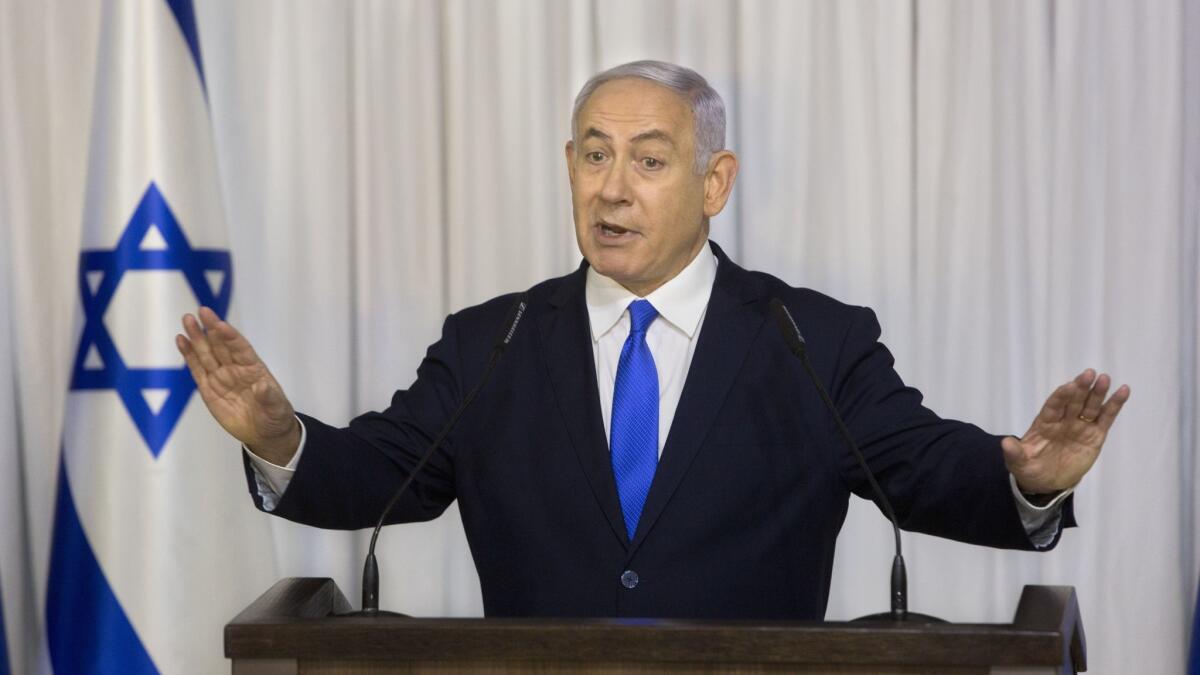Israel’s Benjamin Netanyahu set to be indicted in corruption cases as election looms

Reporting from Jerusalem — After months of anticipation, Israel’s attorney general announced his intentions to indict Prime Minister Benjamin Netanyahu in three criminal cases, an unprecedented action likely to have a major, if uncertain, impact on his chances to win a fourth consecutive term in the nation’s April 9 elections.
In a 57-page letter, Atty. Gen. Avichai Mandelblit said he had decided, after the conclusion of more than two years of criminal investigations, that Netanyahu, 69, should face charges of fraud, bribery and breach of public trust.
In the case considered most legally perilous, Netanyahu is accused of abusing his role as minister of communications so as to provide regulatory concessions to his friend, the Israeli communications titan Shaul Elovitch, who was the controlling shareholder of Bezeq telecom.
Mandelblit also announced his intention to indict Elovitch, who is accused of benefiting by up to $300,000 from the deal, through which Walla news, Bezeq’s popular website, was to provide Netanyahu supportive coverage.
Pending a hearing in which Netanyahu has the right to dispute each of the charges, formal indictments would be filed against the prime minster, who is seeking reelection in a polarized political field in which more than two dozen parties are vying for 120 seats in the Knesset, Israel’s parliament.
“You have damaged the reputation of public service and the public’s faith in it,” Mandelblit wrote, in a blistering explanation of his long-awaited decision. “You operated under conflict of interests, you abused your authority ... and you corrupted public servants working under you,” he said, in a reference to numerous senior Netanyahu aides whose testimony as state’s witnesses helped to build the prosecution’s brief.
In addition to the Bezeq case, Netanyahu also could face trial in a matter called Case 2000, in which prosecutors say recordings obtained by the police show he negotiated with Arnon Mozes, the publisher of the popular tabloid Yediot Aharonot, to quash its principal rival, the pro-Netanyahu daily free paper Israel Hayom, owned by American casino magnate Sheldon Adelson, in exchange for favorable coverage for the prime minister.
The attorney general also announced he intended to indict Mozes.
In a third investigation dubbed Case 1000, Netanyahu is accused of fraud and breach of trust for allegedly demanding and accepting luxurious gifts including champagne and cigars and jewelry for his wife, Sara, from wealthy business contacts including Hollywood-based producer Arnon Milchan and the Australian billionaire James Packer.
Though unsurprising after months of media leaks, the indictments threw the country into a frenzy.
“Everything has now changed for Netanyahu,” the prime minister’s biographer, Anshel Pfeffer, wrote in Haaretz. Changing the attorney general’s decision, though theoretically possible, Pfeffer said, “will be especially difficult.”
“One of the largest teams of investigators ever — from the police and Securities Authority, and attorneys at all levels of the Justice Ministry — have worked on this case for three years,” Pfeffer noted, summarizing Netanyahu’s predicament. “There was even a ‘devil’s advocate’ team of lawyers tasked with presenting the defendants’ case.”
Netanyahu’s leading position in the polls has held steady since he announced the April 9 elections in December. But it is difficult to predict the effect of the announcement on Israel’s polarized political landscape.
In an impassioned speech following Mandelblit’s announcement, Netanyahu charged that the planned indictments were no more than a plot led by the media, the judiciary and his left-wing opposition to overthrow his lengthy rule.
“It is an outrage aimed at overthrowing the right-wing government and replace it with left-wing government,” he said. “That’s their aim.”
Referring to himself in the third person, as “Benjamin Netanyahu, the most maligned man in the history of Israeli media,” the prime minister said the case laid out against him endangered Israeli democracy, and, for the last three years, had put his family “through the seven circles of hell.”
Netanyahu also called the investigation a “witch hunt” as well as a “house of cards that will end up as dust.”
“The left knows it can’t win at the ballot box,” he said, “so they are persecuting me to topple the government and bring Lapid and Gantz to government,” in reference to Benny Gantz and Yair Lapid, two prominent opposition leaders who called on him to resign after the attorney general’s announcement was made public.
Labor Party leader Avi Gabbay also called on Netanyahu to resign, saying in a radio interview that “this is a black day for the country.”
“The prime minister is a national symbol. I ask you not to embarrass the citizens and fight to clear your name not from the prime minister’s residence,” Gabbay said.
Israel’s judiciary has a history of uncompromising legal prosecutions of senior political figures. Facing the accusation of rape, Moshe Katsav resigned the presidency in 2007. He was convicted in 2010 and, a year later, was sentenced to seven years in jail.
In 2014, former Prime Minister Ehud Olmert was convicted of corruption charges, eventually serving 16 months out of a 27-month sentence for fraud and bribery.
In a statement, Netanyahu’s party, Likud, said the announced indictments represented “political persecution” and also called it a “witch hunt.”
“The unilateral publication of the attorney general’s decision only a month before the elections, without giving the prime minister an opportunity to refute these false accusations, is a blatant and unprecedented intervention in the elections,” the party stated. “We must not allow this to happen.”
Tarnopolsky is a special correspondent.
More to Read
Sign up for Essential California
The most important California stories and recommendations in your inbox every morning.
You may occasionally receive promotional content from the Los Angeles Times.









